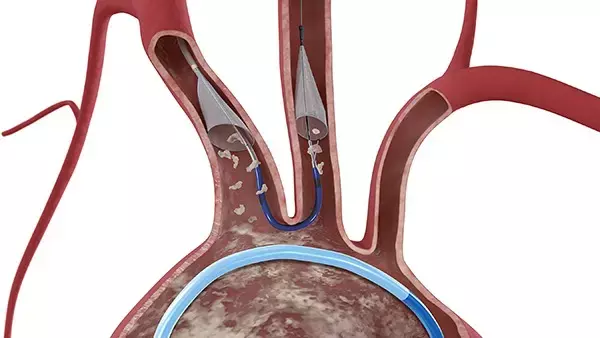- Home
- Medical news & Guidelines
- Anesthesiology
- Cardiology and CTVS
- Critical Care
- Dentistry
- Dermatology
- Diabetes and Endocrinology
- ENT
- Gastroenterology
- Medicine
- Nephrology
- Neurology
- Obstretics-Gynaecology
- Oncology
- Ophthalmology
- Orthopaedics
- Pediatrics-Neonatology
- Psychiatry
- Pulmonology
- Radiology
- Surgery
- Urology
- Laboratory Medicine
- Diet
- Nursing
- Paramedical
- Physiotherapy
- Health news
- Fact Check
- Bone Health Fact Check
- Brain Health Fact Check
- Cancer Related Fact Check
- Child Care Fact Check
- Dental and oral health fact check
- Diabetes and metabolic health fact check
- Diet and Nutrition Fact Check
- Eye and ENT Care Fact Check
- Fitness fact check
- Gut health fact check
- Heart health fact check
- Kidney health fact check
- Medical education fact check
- Men's health fact check
- Respiratory fact check
- Skin and hair care fact check
- Vaccine and Immunization fact check
- Women's health fact check
- AYUSH
- State News
- Andaman and Nicobar Islands
- Andhra Pradesh
- Arunachal Pradesh
- Assam
- Bihar
- Chandigarh
- Chattisgarh
- Dadra and Nagar Haveli
- Daman and Diu
- Delhi
- Goa
- Gujarat
- Haryana
- Himachal Pradesh
- Jammu & Kashmir
- Jharkhand
- Karnataka
- Kerala
- Ladakh
- Lakshadweep
- Madhya Pradesh
- Maharashtra
- Manipur
- Meghalaya
- Mizoram
- Nagaland
- Odisha
- Puducherry
- Punjab
- Rajasthan
- Sikkim
- Tamil Nadu
- Telangana
- Tripura
- Uttar Pradesh
- Uttrakhand
- West Bengal
- Medical Education
- Industry
Cerebral Protection System reduces rates of CV events and mortality after TAVR

Almost 4% of individuals over 70 and more than 9% over 80 years of age suffer from severe aortic stenosis (AS). Transcatheter aortic valve replacement (TAVR) has revolutionized treatment options in this common disease, especially in patients with high surgical risk. Despite ongoing improvements in the TAVR procedure, a significant risk of stroke remains. In a recent study, researchers reported that using Sentinel™ device significantly improves clinical outcomes in TAVR patients. The study findings were published in the Journal of Personalized Medicine on February 03, 2022.
Until recently, the Sentinel™ Cerebral Protection System (CPS; Boston Scientific, Marlborough, MA, USA) has been the only commercially available device for mechanical prevention of TAVR-related stroke. However, its effectiveness is still undetermined. Therefore, Dr Julia Mascherbauer and her team conducted a study to explore the impact of Sentinel™ on stroke rate, length of hospital stay (LOS), and twelve-month mortality.
In a single-centre, real-world all-comer intention-to-treat study, the researchers included 411 patients assigned to TAVR with or without Sentinel™. Of 411 patients (80 ± 7 y/o, EuroSCORE II 6.3 ± 5.9%), Sentinel™ was used in 213 (51.8%), with both filters correctly deployed in 189 (46.0%). They determined the primary endpoint as clinically detectable cerebrovascular events within 72 h after TAVR. Secondary endpoints assessed were LOS and 12-month mortality. They used logistic and linear regression analyses to assess associations of Sentinel™ use with endpoints.
Key findings of the study:
- The researchers observed twenty (4.9%) cerebrovascular events, ten (2.4%) of which were disabling strokes.
- They found that the patients with Sentinel™ suffered 71% less (univariate analysis; OR 0.29) and 76% less (multivariate analysis; OR 0.24) cerebrovascular events compared to patients without Sentinel™.
- They also found that Sentinel™ use was also significantly associated with shorter LOS (Regression coefficient −2.47) and lower 12-month all-cause mortality (OR 0.45).
The authors concluded, "In the present prospective all-comers TAVR cohort, patients with systematic use of Sentinel™ showed (1) reduced rates of cerebrovascular events, (2) shortened length of hospital stay (LOS) after TAVR, and (3) a reduction of all-cause mortality at 12 months. These data promote the use of a CPS when implanting TAVR valves. Long-term cost-effectiveness and the impact of anatomical constraints, necessitating customized procedural approaches, require further study."
Keywords: Sentinel™ Cerebral Protection System, transcatheter aortic valve replacement, TAVR, TAVR-related stroke, length of hospital stay, stroke rate, mortality rate, Journal of Personalized Medicine.
Medical Dialogues Bureau consists of a team of passionate medical/scientific writers, led by doctors and healthcare researchers. Our team efforts to bring you updated and timely news about the important happenings of the medical and healthcare sector. Our editorial team can be reached at editorial@medicaldialogues.in.
Dr Kamal Kant Kohli-MBBS, DTCD- a chest specialist with more than 30 years of practice and a flair for writing clinical articles, Dr Kamal Kant Kohli joined Medical Dialogues as a Chief Editor of Medical News. Besides writing articles, as an editor, he proofreads and verifies all the medical content published on Medical Dialogues including those coming from journals, studies,medical conferences,guidelines etc. Email: drkohli@medicaldialogues.in. Contact no. 011-43720751


